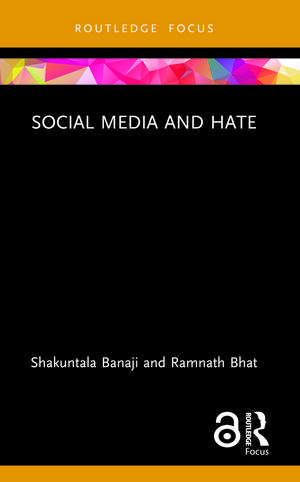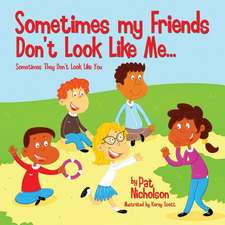Social Media and Hate: Routledge Focus on Communication and Society
Autor Shakuntala Banaji, Ramnath Bhaten Limba Engleză Hardback – 31 dec 2021
Social Media and Hate argues that these phenomena, and the extreme violence and discrimination they initiate against targeted groups, are connected to the socio-political contexts, values and behaviours of users of social media platforms such as Facebook, TikTok, ShareChat, Instagram and WhatsApp. The argument moves from a theoretical discussion of the practices and consequences of sectarian hatred, through a methodological evaluation of quantitative and qualitative studies on this topic, to four qualitative case studies of social media hate, and its effects on groups, individuals and wider politics in India, Brazil, Myanmar and the UK. The technical, ideological and networked similarities and connections between social media hate against Muslims, Dalits, dissenters, feminists, LGBTQi groups, Rohingya and immigrants in all four contexts is highlighted, stressing the need for an equally systematic political response.
This is an insightful text for scholars and academics in the fields of Cultural Studies, Community Psychology, Education, Journalism, Media and Communication Studies, Political Science, Social Anthropology, Social Psychology, and Sociology.
| Toate formatele și edițiile | Preț | Express |
|---|---|---|
| Paperback (1) | 155.43 lei 3-5 săpt. | +17.42 lei 6-12 zile |
| Taylor & Francis – 27 mai 2024 | 155.43 lei 3-5 săpt. | +17.42 lei 6-12 zile |
| Hardback (1) | 478.13 lei 6-8 săpt. | |
| Taylor & Francis – 31 dec 2021 | 478.13 lei 6-8 săpt. |
Preț: 478.13 lei
Nou
91.50€ • 94.53$ • 76.11£
Carte tipărită la comandă
Livrare economică 20 martie-03 aprilie
Specificații
ISBN-10: 0367537273
Pagini: 140
Ilustrații: 1 Tables, black and white; 2 Halftones, black and white; 2 Illustrations, black and white
Dimensiuni: 138 x 216 x 10 mm
Greutate: 0.31 kg
Ediția:1
Editura: Taylor & Francis
Colecția Routledge
Seria Routledge Focus on Communication and Society
Locul publicării:Oxford, United Kingdom
Public țintă
Postgraduate and Undergraduate AdvancedNotă biografică
Ramnath Bhat is postdoctoral fellow at the International Centre for Advanced Studies in New Delhi and visiting fellow in the Department of Media and Communications at the London School of Economics and Political Science.
Cuprins
Recenzii
- Deshdeep Dhankhar, Policy Fellow at Tata Institute of Social Sciences, Mumbai, LSE Review of Books
Descriere
Using expert interviews and focus groups, this book investigates the theoretical and practical intersection of misinformation and social media hate in contemporary societies.
Social Media and Hate argues that these phenomena, and the extreme violence and discrimination they initiate against targeted groups, are connected to the socio-political contexts, values and behaviours of users of social media platforms such as Facebook, TikTok, ShareChat, Instagram and WhatsApp. The argument moves from a theoretical discussion of the practices and consequences of sectarian hatred, through a methodological evaluation of quantitative and qualitative studies on this topic, to four qualitative case studies of social media hate, and its effects on groups, individuals and wider politics in India, Brazil, Myanmar and the UK. The technical, ideological and networked similarities and connections between social media hate against Muslims, Dalits, dissenters, feminists, LGBTQi groups, Rohingya and immigrants in all four contexts is highlighted, stressing the need for an equally systematic political response.
This is an insightful text for scholars and academics in the fields of Cultural Studies, Community Psychology, Education, Journalism, Media and Communication Studies, Political Science, Social Anthropology, Social Psychology, and Sociology.





































